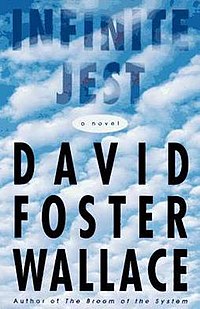prints, drawings, paintings, web development, blog posts, link to etsy shop
The "Off" Season and David Foster Wallace

After St. George, I needed a vacation from myself. And I've spend the last few weeks generally absent. I'm still not sure what it will take to re-engage at this point, but I guess writing this blog is my attempt at a start.
In my absent time, I've been paying attention to things that might possess the ability to take my mind off the disappointing - or better, devastating - start to my tri season: reading, working, not logging into Facebook, reading, listening to music, working, reading, gardening, working... and mostly, just reading. For those of you I've not told, I've been reading ONE book. And I've been reading it for about two years. The same book. Did I mention it's been TWO years? I'm a slow reader.
The book is Infinite Jest by David Foster Wallace. I'm reading it because, time and again, THIS website analyzed my writing and said I write like David Foster Wallace.
Infinite Jest has almost one thousand pages and more than two hundred pages of footnotes.. oops, I mean "endnotes." The endnotes have footnotes. There are sentences that go on for six pages. Some go on for ten. Many chapters have the same title. Reading the physical book requires more than one bookmark. It barely fits in my carry-on luggage (in fact, ironically, it renders my carry-on luggage too heavy to carry on). For a while, I carried it around just to be able to say I was weight training.
Then I got the electronic version of the book. And I was able to finish almost 40 percent of it before the first year-and-a-half passed. Mostly because I didn't get lost or confused or tired from flipping back and forth.
I'm now on page 811. I have less than 200 pages to go and only two pages of footnotes - oops, I mean endnotes - left. And I fear that I'm beginning to know why David Foster Wallace "erased his own map" (so to speak). He was depressed. I can tell because he describes one of his character's depression better than any self-help book I've ever read (and I've read a lot of them). In Infinite Jest - ironically, a novel - D.F.W. nails the unexplainable better than non-fiction writers who try specifically to explain it. He clarifies the thing I find myself describing as: "something I can't explain, that you cannot possibly hope to understand unless you've been there."
Although that's not what the book is about.
Despite the fact that I'm enjoying Infinite Jest, part of my brain is worrying that this book has become a surrogate for all those things I've failed to finish. Like Ironman St. George. Is finishing this book the monumental task that I can use to prove to myself that I'm still tough? Still capable of suffering? (Did I mention it's already taken me two years?) The other part of my brain just wants a release from the suffering and beating myself up.
In the end, the one thing I'm sure of is that Infinite Jest is a book of irony. Not only within, the irony extends beyond its pages and spills out into my own realm. In fact, (spoiler alert) the book's title refers to a fictional film that renders the viewer catatonic with pleasure... which is, hilariously - and coincidentally, ironically - the exact reason why I've been reading it these past few weeks. To escape from myself. Infinite jest, indeed - because now the book, ironically, has brought me full circle - right back to what it feels like to be depressed.
Well played, D.F.W., well played.
tags
archive
- May 2021 (1)
- December 2020 (1)
- September 2018 (1)
- September 2017 (2)
- July 2017 (1)
- June 2017 (3)
- May 2017 (1)
- April 2017 (3)
- January 2017 (2)
- November 2016 (1)
- October 2016 (1)
- August 2016 (2)
- July 2016 (5)
- June 2016 (10)
- April 2016 (1)
- March 2016 (1)
- February 2016 (1)
- January 2016 (2)
- December 2015 (1)
- November 2015 (1)
- September 2015 (2)
- June 2015 (1)
- May 2015 (1)
- April 2015 (1)
- March 2015 (2)
- February 2015 (1)
- January 2015 (1)
- December 2014 (1)
- November 2014 (1)
- October 2014 (2)
- September 2014 (2)
- August 2014 (2)
- July 2014 (2)
- June 2014 (1)
- May 2014 (3)
- April 2014 (1)
- March 2014 (1)
- February 2014 (1)
- January 2014 (2)
- November 2013 (3)
- October 2013 (3)
- September 2013 (2)
- August 2013 (2)
- July 2013 (2)
- May 2013 (2)
- March 2013 (2)
- January 2013 (20)
- December 2012 (18)
- November 2012 (28)
- October 2012 (14)
- September 2012 (1)
- August 2012 (2)
- July 2012 (1)
- June 2012 (3)
- May 2012 (2)
- April 2012 (2)
- March 2012 (4)
- February 2012 (2)
- January 2012 (1)
- December 2011 (3)
- November 2011 (3)
- October 2011 (5)
- September 2011 (2)
- August 2011 (3)
- July 2011 (4)
- June 2011 (6)
- May 2011 (5)
- April 2011 (7)
- March 2011 (6)
- February 2011 (5)
- January 2011 (6)
- December 2010 (3)
- November 2010 (4)
- October 2010 (5)
- September 2010 (9)
- August 2010 (5)
- July 2010 (9)
- June 2010 (4)
- May 2010 (4)
- April 2010 (3)
- March 2010 (2)
- February 2010 (4)
- January 2010 (7)
- December 2009 (3)
- November 2009 (1)
- October 2009 (6)
- September 2009 (4)
- August 2009 (6)
- July 2009 (4)
- June 2009 (13)
- May 2009 (7)
- April 2009 (7)
- March 2009 (10)




Add new comment